Range of Emotions Rivaled the Number of Candidates
- Share via
BAGHDAD — Homemaker Alaa Abed Mehdi had no intention of risking her life to vote Sunday. Early-morning explosions only strengthened that resolve.
Then Mehdi, 27, looked out her window and saw history passing by -- in groups of twos and threes.
Braving threats of suicide attacks and mortar strikes, scores of Iraqis -- many wearing their best suits and dresses -- filed by Mehdi’s house in a quiet procession toward the heavily guarded polling center down the street.
“It was an amazing scene,” Mehdi said. “I never expected to see such a sight. It made me wonder why I was not taking part.”
Inspired by her neighbors, Mehdi changed her mind, grabbed a coat and voted for the first time in her life.
For millions of Iraqis, election day began with an agonizing personal decision, balancing fears of insurgent attacks with a yearning to share in a defining national moment. Often the course people had planned was not the choice they ultimately made.
Allya Mohammed, a Shiite Muslim in western Baghdad, could hardly wait to vote. But the sounds of explosions Sunday morning led her husband to urge her to stay home with the children.
Later in the day, Mohammed, 37, was filled with regret, particularly after seeing other homemakers in the neighborhood return with ink-stained index fingers, a sign of their participation in the vote.
“I wish this was a dream so tomorrow I could wake up and have the chance again to vote,” she said.
So it went Sunday around the nation. There were those with purple fingers and those without.
For those who voted, Sunday was a day of national celebration. Under the watchful eye of tens of thousands of U.S. and Iraqi troops, some parts of Baghdad took on a carnival-like atmosphere.
Children turned deserted streets into soccer fields. Old men played dominoes.
At one polling station, children teased U.S. soldiers, playfully pinning election buttons on their uniforms. An Iraqi army soldier slapped a colorful get-out-the-vote sticker on his rifle.
But for Sunni Arab Muslims, many of whom boycotted the vote or avoided polling stations out of fear, election day was like standing outside a window, watching revelers at a big party.
In the mostly Sunni neighborhood of Adimiya, purple fingers were hard to find. Many residents holed up in their homes after an intense Sunday morning gun battle between insurgents and police.
Auto mechanic Khatab Omar, 33, scoffed at the jubilant mood seen elsewhere in the city and chastised a Sunni friend who had decided to vote at the last minute.
“No patriot would vote,” Omar said. “This election is no big deal. I don’t even care who wins. They won’t represent me.”
Violence and intimidation kept some voters away from the polls. Retiree Adnan Mohammed, 56, a Shiite Muslim, turned on the television Sunday morning and was horrified by the suicide attacks at polling stations. He opened his front door and looked around his Sunni-majority neighborhood.
“It was like a city of ghosts,” Mohammed said. “No one was even walking on the streets. I realized it would be better for me to stay in like everyone else around me. I guess they will have to do without my vote.”
Jaffer Nima Kateeb, a 45-year-old high school teacher, is also a Shiite who lives in a largely Sunni area. When he left his house to vote, he saw many of his neighbors -- some former members of Saddam Hussein’s elite security force -- sitting in front of their homes in chairs, waiting to see who would vote.
Nervous, he returned to his house. Later in the day, his brother called and urged him to vote. “They can’t kill everyone,” his brother told him.
Kateeb mustered his courage, gathered his family and walked to the polling center, politely greeting his watchful neighbors.
“I don’t care,” he said. “It made me feel very happy.”
Courage was contagious as the day wore on and turnout rose noticeably.
Many families found creative ways around the risks, such as sending a single family member to vote for everyone. Though election officials said such voting would not be permitted, some neighborhood polling stations allowed fathers or eldest sons to display identification cards for other family members and vote several times.
At one center, a young man asked to dip two fingers into the ink to prove to his mother back home that he had cast her ballot as requested.
In central Baghdad, a toothless elderly woman covered in a black abaya complained that she had no husband or children to help her to the polls. But she was determined to vote, so she started making her way to the polling center before 7 a.m.
The woman, Sabria Rubaie, was sent away because her name did not appear on the registration list, but she returned in the afternoon and was permitted to register and vote.
Asked whether she worried about attacks, Rubaie laughed and wagged a purple-stained finger.
“No, no, no,” she said. “What do I have to be afraid of? I wasn’t afraid of the war. Why would I be afraid now?”
Special correspondents Caesar Ahmed, Zainab Hussein and Saif Rasheed contributed to this report.
More to Read
Sign up for Essential California
The most important California stories and recommendations in your inbox every morning.
You may occasionally receive promotional content from the Los Angeles Times.











